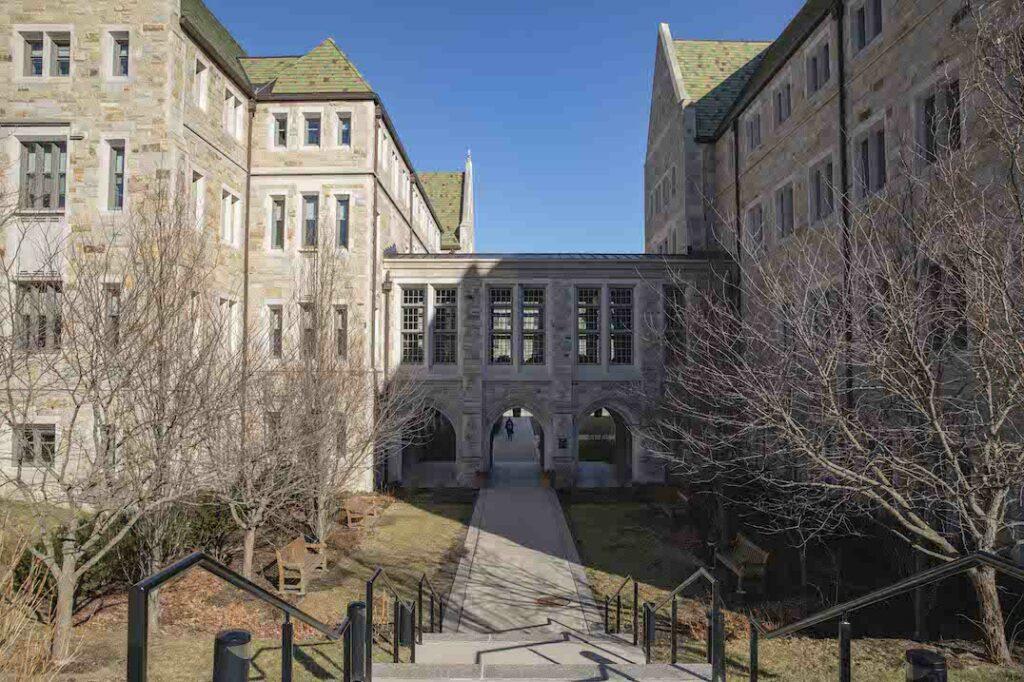Only four students ran for the five open seats for the Class of 2021’s senators, leaving a seat vacant.
The referendum, which called for expanding access to most of Upper Campus to students with walking disabilities, passed with 93.42 percent of the vote. While 2,032 students voted in favor of the pathway, 143 students voted against it.
UGBC Director of Diversity and Inclusion Conor McCormick, MCAS ’22, and chairs of the Council for Students with Disabilities Nicholas Claudio, MCAS ’22, and Svea McNally, Lynch ’22, expressed their support for the referendum in a statement to The Heights.
“We are happy to see that 93 percent of the people who voted on the referendum saw the necessity of an accessible route to Upper Campus,” the statement reads. “This referendum is one of many steps the Council for Students with Disabilities has taken in the past two years to create a more equal campus for students of all abilities.”
Most of Upper Campus, which houses approximately 60 percent of freshmen students, is accessible only by stairs or by a longer route on a sidewalk around the perimeter. Individuals in wheelchairs cannot access Upper Campus by the sidewalk, however, because the sidewalk is obstructed by a pole. Some freshman students live in the College Road residence halls on Upper Campus, which is accessible by sidewalk. The other 40 percent of freshmen live on Newton Campus, which is accessible by buses equipped with accommodations for people in wheelchairs.
Though there is accessible housing available to freshman students with walking disabilities, some events are held on Upper Campus, including in the O’Connell House, which students in wheelchairs are unable to independently access.
“We are thrilled with the passing of the referendum,” the UGBC executive branch wrote in a statement to The Heights. “We will work closely with the Council for Students with Disabilities and Administrators to make sure Upper Campus is Accessible for all.”
The referendum is non-binding, meaning that the University does not need to abide by the results.
In 2018, the University rejected the results of a student referendum in which 94 percent of voters said that the group Students for Sexual Health should be able to distribute contraceptives on campus, without University funding or recognition. BC cited the fact that it is a Jesuit, Catholic university as the reason for its opposition to the distribution of contraceptives on campus.
Last year, 84 percent of student voters checked “yes” on a referendum asking if BC should withhold investments from the fossil fuel industry. The University remained opposed to divestment, saying that it does not view divestment as a viable solution to climate change and instead focuses on its own sustainability measures.
“Not only do we hope that this referendum garners increased student support for our ongoing projects (ie. Eagle Escort, Stadium Accessibility, improving the accessibility of building entrances, etc.), but we also hope to use the number of students standing behind it as a way to show the administration how significant and necessary this pathway is,” the statement from McCormick, Claudio, and McNally reads.
UGBC has not had a senate since the end of the spring semester, when the terms for the active UGBC Senate expired. The election for this year’s UGBC Senate was delayed until the fall due to the school’s closure in March. This left UGBC without an assembly body over the summer, when the executive administration moved to scrap the freshman mentorship program, the Undergraduate Leadership Academy.
In Tuesday’s election, students only voted for their own class representative.
Laura Perrault, Samuel O’Connor, Daniel Jin Sung, all MCAS ’21, and James Frierich, CSOM ’21, will fill four of the five open seats for the Class of 2021’s senators. Perrault received 27.1 percent of the vote, O’Connor received 26.06 percent, Jin Sung received 23.76 percent of the vote, and Frierich received 23.04 percent of the vote.
Jack Bracher, Gianna Russi, Leonardo Escobar, Douglas Baker, and Urwa Hameed, all MCAS ’22, won the election to fill five Class of 2022 seats in the UGBC Senate. Bracher received 14.95 percent of the vote, Russi received 13.3 percent, Escobar received 12.46 percent, Baker received 9.65 percent, and Hameed received 9.59 percent. Bracher, Escobar, and Baker are all former UGBC senators.
Alexandra Katz, Lynch ’23, and Madeleine McGrath, Dennis Wieboldt, Savannah Cutliff, and Julia Spagnola, all MCAS ’23, won the election to fill the Class of 2023 seats. Katz received 14.17 percent of the vote, McGrath received 11.52 percent, Wieboldt received 11.44 percent, Cutliff received 11.1 percent, and Spagnola received 10.38 percent.
Wieboldt is a former UGBC senator and presidential candidate. Lorenzo Leo, MCAS ’23, who ran for UGBC vice president last year on Wieboldt’s ticket, came in sixth with 10.02 percent of the vote, losing to Spagnola by 13 votes.
Jordan Nakash, Anabel Stavrand, Jonah Kotzen, Justin Smith, and Sasha Wong, all MCAS ’24, won the election for the Class of 2024 senate seats. Nakash received 13.64 percent of the vote, Stavrand received 13.2 percent, Kotzen received 10.31 percent, Smith received 10.26 percent, and Wong received 10.2 percent.
Olivia Deval, MCAS ’23, won the election for the transfer student senate seat with 44.31 percent of the vote, beating out two other candidates for the position.
Featured Image by Maggie DiPatri / Heights Editor



















